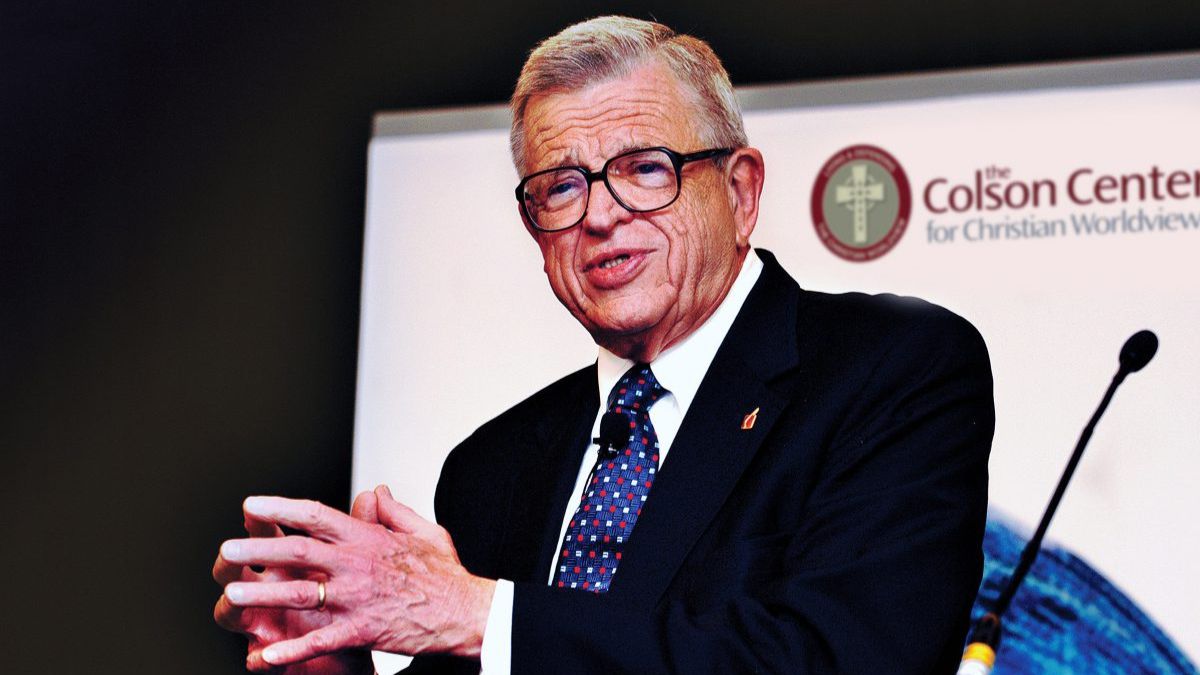

Is God Having a Cultural “Moment”?
The rise in Bible sales and God talk will hopefully go deeper than seeking “useful” help.
02/10/25
John Stonestreet and Shane Morris

God seems to be having a moment, culturally speaking. So is the Bible, it seems.
In December, the Wall Street Journal reported that Bible sales were up 22% in the U.S. last year, while sales of other books were essentially flat. In fact, in 2019, 9.7 million copies of the Bible were sold in America. Last year, that number approached 14 million, with most sales driven by “first-time buyers.”
Then there is football, with Ohio State players preaching to students last summer and on national television after winning the national championship, Boise State head coach Spencer Danielson praising Jesus at the Fiesta Bowl, and Baltimore Ravens head coach John Harbaugh leading his team in the Lord’s Prayer, God-talk on and off the field has been conspicuous this season.
Or consider the “moment” God is having among secular thought leaders. Richard Dawkins and Elon Musk, recognizing the importance of Christianity to the West, have labeled themselves “cultural Christians.” Former New Atheist Ayaan Hirsi Ali experienced and defended a conversion to Christian faith, as did her husband, well-known historian and Hoover Institute fellow Niall Ferguson. Former atheist and popular historian Tom Holland’s bestselling book has changed the narrative about the positive role Christianity has played in making the Western world. Psychologist and author Jordan Peterson often references Scripture and just released a 500-page book attempting to draw lessons and meaning from the Old Testament. And, of course, podcaster Joe Rogan recently interviewed Christian apologist Wesley Huff for his 14 million subscribers.
Justin Brierley, co-host of the “Unbelievable” podcast and author of The Surprising Rebirth of Belief in God, thinks we are seeing something significant:
[T]hey say God moves in mysterious ways. I see signs that he is moving in the minds and hearts of secular intellectuals. Many of them are recognizing that secular humanism has failed and, against all their expectations, seem to be on the verge of embracing faith instead.
Brierley thinks this “wider turning of the secular tide in the West,” is a result of secularism’s failed predictions. A couple decades ago, the New Atheists promised a rational utopia in the wake of religious decline. Instead, we got a crisis of meaning, widespread “confusion, a mental health crisis in the young, and the culture wars.” Now, a “New Theist” movement has sprung up, and even those not converting to Christ have toned down the anti-Christian rhetoric. Some are even suggesting that faith is good for the world.
Still, Brierley cautions that what we’re seeing is far from a revival. Many of the “cultural Christians” of our moment are not believers, nor are they claiming to be. There’s a big difference in regarding Christianity as a “useful fiction,” able to restore vigor and cohesion to the West, and submitting to it as the ultimate truth which demands our allegiance and devotion. For the millions of new Bible owners, the difference is between looking for sage advice and looking for God. Neither a better world nor a better you is what Christianity fundamentally offers.
Though a “vibe shift” in favor of religion is welcome, and cultural Christianity is genuinely a good thing, Christ does not claim to be “useful.” He claims to be the risen Son of God and King of kings, before whom every knee must bow. Those hoping to make Him “useful” overlook that the West did not become a great civilization because people believed Christianity offered good advice, but because they believed it was true. Anyone who tries to use the God of the Bible to some earthly end will only be repeating the blunder of Mainline Protestantism, not doing something genuinely new or important.
At the same time, the truth about Christ is compelling. Thus, the renewed interest of this cultural moment can be welcomed and celebrated. Secularism has failed to satisfy the human soul or build the utopia that was promised. But Christ will not fail, not in this world nor in the age to come. Our task is to point insistently to the full and glorious truth of His rule and reign.
We can direct the curious to resources like The Bible Project, or Graeme Goldsworthy’s classic book, According to Plan, both of which explain what the Bible is and what it teaches. Proven apologetic classics like C.S. Lewis’ Mere Christianity and the timeless accounts of conversion like St. Augustine’s Confessions are incredibly helpful resources for those willing to give God a new look. Most importantly, the Church must be the Church, with the Word faithfully taught and lived. After all, we know that God’s Word will not return void, and He is at work through His people in this and every cultural moment.
Have a Follow-up Question?
Related Content

© Copyright 2020, All Rights Reserved.














